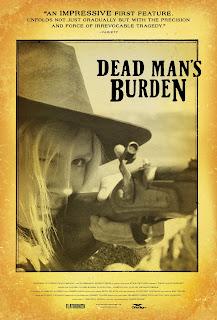
I’m convinced that, of all genres, the western holds the greatest potential for uncovering a hidden gem. From big-budget productions to low-budget indies, filmmakers across the globe have been exploring the American west for well over a century now. Just imagine how many thousands, if not tens of thousands, of westerns are out there for the taking. When I sit down to watch a new western, I always hold out hope that it will be something special.
Dead Man’s Burden, the 2012 directorial debut of Jared Moshe, is something special.
Set a few years after the American Civil War, Dead Man’s Burden tells the tale of two siblings attempting to reconnect, each hiding a secret from the other that could ruin any chance of a happy reunion. Wade McCurry (Barlow Jacobs), a former Sergeant-Major in the Army, receives word that his estranged father is dead. Having stayed away from the family’s New Mexico farm for ten years, Wade finally arrives home, where he is reunited with his younger sister Martha (Clare Bowen), now the wife of Heck Kirkland (David Call).
With their father gone, Martha intends to sell the farm to a mining company, whose representative E.J. Lane (Joseph Lyle Taylor) has made them a very generous offer. Though disappointed (he was hoping to settle down and farm the land), Wade quietly steps aside to allow Martha and Heck to do as they please.
It isn’t until he visits family friend Three Penny Hank (Richard Riehle) that Wade discovers his father’s death might not have been an accident (the old man supposedly fell off his horse). Hank even believes Lane may have had a hand in it (Wade’s and Martha’s father refused to sell, while Martha let it be known she was anxious to move as far away as possible).
Armed with this new information, Wade attempts to bring Lane to justice, though the truth of what really happened to his father may be more than he can bear.
Writer / director Moshe doesn’t conceal either Wade’s or Martha’s secrets from the audience. In the film’s opening scene, we watch Martha gun down her father (played briefly by Luce Rains) as he is riding away. As for Wade, while still making his way home, he has a run-in with two brothers (Adam O’Byrne and Travis Hammer) who are out hunting. Wade tells them his family originally hailed from Texas, but when they ask which Confederate General he served under, Wade is hesitant to reply. That’s because Wade did not fight for the Confederacy. He was a Union officer, which is what caused the initial rift between he and his father. In fact, when Wade first arrives at the farm, Martha believes he’s an imposter because she was told Wade had died years earlier while on his way to enlist with the Confederates.
Yet even with their secrets, a fondness develops between Wade and Martha, who have a genuine love for one another. Martha tells Heck that Wade was always more a father to her than their actual dad, while Wade is clearly pleased that the young girl he left behind has matured into a smart, hard-working woman. We know more than they do, of course, and once the truth is out about them both, their relationship will likely be ruined. One of the film’s strengths is that, because we see the love they have for one another, the weight of their inevitable falling out grows heavier with each passing scene.
Moshe does a fine job developing his characters while also taking advantage of the picturesque New Mexico landscape (there are some truly stunning shots in this film). Still, Dead Man’s Burden does stumble a little in the third act when a gunfight breaks out. While most of the movie was shot in a classical style, a la John Ford, this firefight took a more modern approach, with rapid cuts that not only feel out of place, but make the action confusing and hard to follow.
Fortunately, this was the film’s lone weakness. A dramatic, well-crafted tale of family bonds stretched to their breaking point, and featuring a cast of mostly unknowns, Dead Man’s Burden did, indeed, prove to be a hidden gem.
Rating: 8 out of 10
